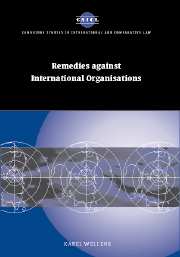Book contents
- Frontmatter
- Contents
- Acknowledgements
- List of abbreviations
- Introduction
- Part I General features of remedies against international organisations
- Part II Procedural aspects of remedial action against international organisations
- Part III Substantive outcome of remedial action against international organisations
- Part IV Alternative remedial action against international organisations and options for the future
- 16 Introduction to alternative remedial action against international organisations and options for the future
- 17 Pre-remedial action
- 18 Non-legal alternative remedial action
- 19 Amendment of existing judicial remedies
- 20 An inevitable role for the International Court of Justice
- Conclusion
- Bibliography
- Index
- CAMBRIDGE STUDIES IN INTERNATIONAL AND COMPARATIVE LAW
17 - Pre-remedial action
Published online by Cambridge University Press: 13 July 2009
- Frontmatter
- Contents
- Acknowledgements
- List of abbreviations
- Introduction
- Part I General features of remedies against international organisations
- Part II Procedural aspects of remedial action against international organisations
- Part III Substantive outcome of remedial action against international organisations
- Part IV Alternative remedial action against international organisations and options for the future
- 16 Introduction to alternative remedial action against international organisations and options for the future
- 17 Pre-remedial action
- 18 Non-legal alternative remedial action
- 19 Amendment of existing judicial remedies
- 20 An inevitable role for the International Court of Justice
- Conclusion
- Bibliography
- Index
- CAMBRIDGE STUDIES IN INTERNATIONAL AND COMPARATIVE LAW
Summary
It is hard to overestimate the importance of pre-remedial action because of its prospective nature and thus its preventive potential; several aspects deserve to be mentioned here.
Pre-remedial efforts by international organisations with regard to operational activities should include mechanisms early on as part of the planning process, enabling those put at risk – for instance, by a proposed development project – to protest at the adequacy or opportunity of the undertaking or to demand alternative, less damaging means of implementing the goals sought. More generally, the entitlement of an individual to be heard prior to an administrative authority taking a decision that affects him/her in his/her interests or rights is a central standard of administrative justice with a large pre-remedial effect.
A prerequisite for an effective accountability regime of international organisations, apart from their willingness to implement it, is the existence of a clear and well-defined set of rules: the viability of remedial mechanisms depends in the first place on the existence of a coherent body of substantive rules, norms and practices governing the decisions, acts and operational conduct of international organisations. The responsibility for establishing such a comprehensive framework is not made easy by the variety of political and legal levels on which international organisations function; this responsibility can thus only be a joint one, shared by the international community, national legislators, member states and the organisations themselves: they all have a distinct role to play in providing the yardsticks that are pre-conditional for the proper functioning of any remedial mechanism.
- Type
- Chapter
- Information
- Remedies against International Organisations , pp. 172 - 176Publisher: Cambridge University PressPrint publication year: 2002

